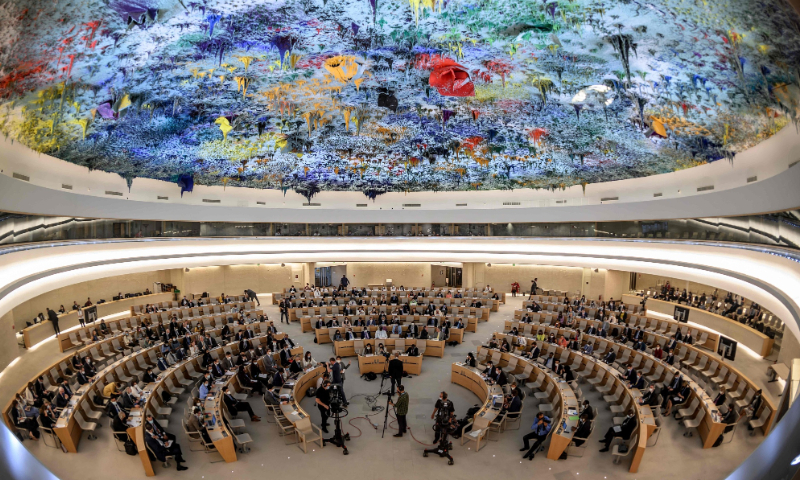
United Nations Human Rights Council File Photo: VCG
With ulterior motives, some Western countries turn a blind eye to the tremendous human rights achievement in China's Xinjiang region and try to politicize and instrumentalize human rights issues to destabilize the region and split China, a senior official from China's Xinjiang region said at the 51st session of the UN Human Rights Council on Monday.
China's Xinjiang region strictly abides by the principles of the Chinese Constitution on respecting and guaranteeing human rights, regards that living a happy life is the primary human right, strives to safeguard and improve people's livelihood, and promotes the cause of human rights to achieve historic achievements, Shawkat Imin, chairman of the standing committee of people's congress of the Xinjiang region said.
The senior official from Xinjiang shared the region's quick development at the Human Rights Council and said that in Xinjiang, all ethnic groups are equal, regardless of the size of population, the length of history, the level of development and the differences in customs and habits. They all participate in state affairs, manage local affairs and exercise grass-roots democratic rights. With the dividends of social stability, people of all ethnic groups are enjoying various rights at a higher level, in a more secure and more sustainable way.
However, some Western countries turned a blind eye on the region's development and politicize human rights issues to destabilize the region, said Shawkat, adding the UN human rights bodies are expected to adhere to the principles of impartiality and objectivity, to safeguard human morality and conscience, and to play their due role in promoting the sound development of the international human rights cause.
"Seeing is believing. We welcome all of you to travel around Xinjiang and experience personally the place that enjoys social stability, sustained development, with its people living and working in peace and contentment," said Shawkat.
On the same day, on behalf of 68 cross-regional countries, a representative from Pakistan made a joint statement to call for not interfering with China's internal affairs on its Xinjiang, Hong Kong and Xizang regions.
"We oppose politicization of human rights and double standards, or interference in China's internal affairs under the pretext of human rights,' said the representative in the statement.
The joint statement also noted that all parties should abide by the purposes and principles of the Charter of the United Nations, adhere to the principles of universality, impartiality, objectivity and non-selectivity, and respect the right of the people of each state to choose independently the path for development in accordance with their national conditions.
All human rights should be treated with the same emphasis, with sufficient importance attached to economic, social and cultural rights and the right to development in particular, according to the statement.
More than 20 countries also made statement to support China's stance at the Human Rights Council.




